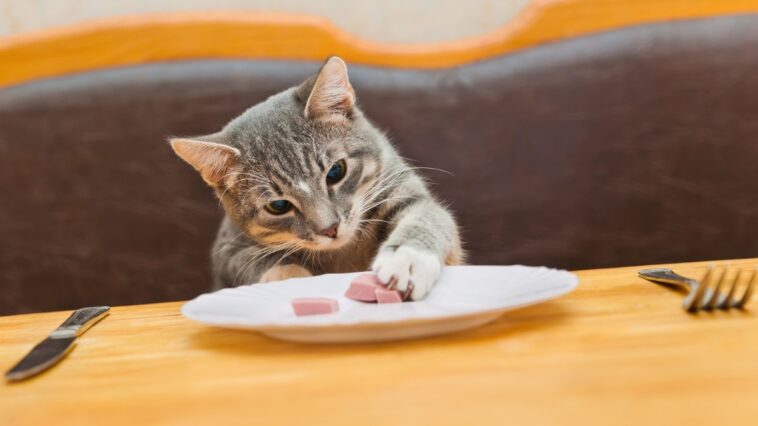As cat owners, we want to ensure our feline companions stay healthy and happy. One of the most important aspects of cat care is providing them with a nutritious and balanced diet. While commercial cat food is a convenient and safe option for feeding our cats, some of us may be tempted to share our human food with our furry friends. However, not all human foods are safe for cats and can cause serious health issues or even be fatal.
In this post, we will discuss foods your cat should never eat, the potential risks and health issues associated with consuming these foods, and provide tips on keeping your cat away from harmful foods. By understanding the dangers of certain foods and taking preventative measures, we can help ensure the health and well-being of our beloved feline companions.
Understanding the Importance of Cat Nutrition
Cats have unique dietary requirements that differ from humans and other animals. A proper diet is essential for maintaining optimal health and preventing various health issues. As responsible cat owners, we must recognize the significance of cat nutrition and its impact on our feline companions’ overall health and well-being.
Cats are obligate carnivores, which means their bodies are designed to thrive on a meat-based diet. Their digestive systems are specifically adapted to process and utilize the nutrients found in animal tissues. The essential nutrients that cats require include high-quality proteins, amino acids like taurine, fatty acids, vitamins, and minerals.
Proper nutrition contributes to healthy skin and coat, sharp eyesight, and improved dental health. It helps support their growth, maintain a healthy weight, promote strong bones and muscles, improve their immune system, and enhance their overall vitality. A well-balanced diet is crucial for meeting these nutritional needs.
However, not all foods are safe for cats to consume. Some human foods can be toxic and potentially life-threatening to them. Cat owners must be aware of these dangerous foods and take necessary precautions to prevent their cats from ingesting them.
In the following sections, we will explore a comprehensive list of foods that cats should never eat, discuss the potential risks and health issues associated with these foods, provide alternative and safe options, offer tips on how to keep your cat away from harmful foods and emphasize the paramount importance of prioritizing your cat’s health and well-being.
By understanding the significance of cat nutrition, we can make informed choices about the foods we offer our beloved feline friends, ensuring their long and healthy lives are filled with joy and vitality.
Foods Your Cat Should Never Eat
While sharing your meals or offering treats to your feline companion may be tempting, it’s crucial to be aware that certain foods can be extremely harmful and even toxic to cats. Here is a comprehensive list of foods that you should never feed your cat:
Onions and Garlic: Both onions and garlic, in all forms (raw, cooked, powdered), contain compounds that can damage a cat’s red blood cells and lead to anemia.
Chocolate: Chocolate contains theobromine, a stimulant that is toxic to cats. Even small amounts of chocolate can cause symptoms like vomiting, diarrhea, rapid breathing, abnormal heart rhythm, and, in severe cases, seizures and even death.
Grapes and Raisins: Grapes and raisins can cause kidney failure in cats. Even a small quantity can lead to symptoms such as vomiting, lethargy, decreased appetite, and increased thirst and urination.
Alcohol: Alcohol can severely impact a cat’s liver and brain. Even a small amount of alcohol can cause intoxication, lack of coordination, tremors and potentially lead to a coma or death.
Caffeine: Caffeinated beverages like coffee, tea, and energy drinks are dangerous for cats. The stimulant effect of caffeine can cause restlessness, rapid breathing, heart palpitations, muscle tremors, and in severe cases, seizures.
Dairy Products: While many cats love milk and other dairy products, they can cause digestive upset, including diarrhea and stomach discomfort, due to lactose intolerance. Cats lack the necessary enzymes to digest lactose properly.
Raw Meat, Fish, and Eggs: Raw or undercooked meat, fish, and eggs may contain bacteria such as Salmonella or E. coli, which can lead to food poisoning and gastrointestinal issues in cats. It’s essential to cook these foods thoroughly before feeding them to your cat.
Bones: Cooked bones, especially those from chicken or fish, can splinter easily and cause choking hazards or internal injuries, including blockages or punctures in a cat’s digestive system.
Xylitol: Xylitol is an artificial sweetener found in many sugar-free products, such as chewing gum, candies, and baked goods. It can lead to a sudden drop in a cat’s blood sugar levels, resulting in weakness, seizures, and, in severe cases, liver failure.
Certain Fruits and Vegetables: Some fruits and vegetables, such as grapes, raisins, onions, garlic, avocado, and certain citrus fruits, contain substances that are toxic to cats and can cause various health issues.
Remember, prevention is key in protecting your feline companion from potential health risks from inappropriate food choices. Be vigilant and keep these foods out of your cat’s reach to ensure their safety and well-being. If you suspect your cat has ingested any of these dangerous foods or exhibits unusual symptoms, consult your veterinarian immediately.
Why Certain Foods are Harmful?
The foods listed above can pose a range of potential health risks and issues for cats, including:
Anemia: Foods like onions and garlic can damage a cat’s red blood cells, leading to anemia. Symptoms of anemia can include weakness, lethargy, pale gums, and decreased appetite.
Kidney Failure: Foods like grapes and raisins can cause kidney failure in cats, leading to symptoms such as vomiting, diarrhea, decreased appetite, and increased thirst and urination.
Gastrointestinal Upset: Raw or undercooked meat, fish, and eggs can contain harmful bacteria like Salmonella or E. coli, which can lead to gastrointestinal upset, including diarrhea and vomiting.
Choking and Blockages: Cooked bones can easily splinter and cause choking hazards or internal injuries, such as blockages or punctures in a cat’s digestive system.
Toxicity: Foods like chocolate, caffeine, and alcohol contain substances that can be toxic to cats. Depending on the amount consumed, these substances can cause symptoms such as vomiting, diarrhea, tremors, seizures, and even death.
Lactose Intolerance: Cats lack the necessary enzymes to digest lactose properly, which can cause digestive upset, including diarrhea and stomach discomfort when they consume dairy products.
Hypoglycemia: Xylitol is an artificial sweetener found in many sugar-free products. It can lead to a sudden drop in a cat’s blood sugar levels, resulting in weakness, seizures, and, in severe cases, liver failure.
Allergic Reactions: Cats can be allergic to certain foods like humans. Common allergens include chicken, fish, and beef. Symptoms of food allergies can include itching, scratching, gastrointestinal upset, and even respiratory distress.
Feeding your cat inappropriate foods can lead to various health issues and potential risks. It’s essential to be aware of these potential dangers and provide your cat with a well-balanced and nutritionally complete diet that meets their needs. Always consult your veterinarian for any concerns or questions regarding your cat’s nutrition and health.
Alternatives Options: Ensuring a Balanced Feline Diet
While it’s crucial to be aware of the harmful foods to cats, plenty of safe and healthy alternatives can ensure a balanced and nutritious diet for your feline companion. Here are some alternatives and safe options to consider:
High-Quality Commercial Cat Food: A cat’s diet should consist of high-quality commercial cat food specifically formulated to meet its nutritional needs. Look for brands that use real meat as the primary ingredient and provide a complete and balanced diet for cats at different life stages.
Wet or Canned Food: Wet or canned cat food can be an excellent option as it provides moisture and can help prevent dehydration in cats. It also tends to have a higher protein content and fewer carbohydrates than dry kibble.
Raw or Cooked Meat: If you prefer a more natural diet, consult your veterinarian about feeding your cat raw or cooked meat. Raw meat diets require careful planning and should be done under the guidance of a veterinary professional. Ensure the meat is high-quality and free from seasoning, bones, and potential contaminants.
Cooked Eggs: Cooked eggs can be a great source of protein for cats. Ensure that they are thoroughly cooked to eliminate any potential bacteria or parasites. Avoid using any seasoning or additives when preparing eggs for your cat.
Fish in Moderation: While fish can be a good source of protein and omega-3 fatty acids, it should be fed in moderation. Cooked fish, such as salmon or whitefish, can be offered as an occasional treat or mixed with their regular diet. Some fish contain high levels of mercury and thiaminase, which can harm cats in large quantities.
Cat-Specific Treats: Choose cat-specific treats that are formulated to meet their dietary requirements. Avoid giving them treats meant for humans, as they may contain harmful ingredients.
Consult with Your Veterinarian: Each cat is unique, and their dietary needs may vary. It’s always a good idea to consult your veterinarian to develop a personalized nutrition plan for your cat based on age, health status, and specific requirements.
Remember, maintaining a balanced feline diet is crucial for their overall health and well-being. Ensure that their diet is appropriate for their life stage, supports their specific nutritional needs, and is provided in the right portion sizes. Regular veterinary check-ups can also help monitor your cat’s health and adjust its diet if necessary.
Tips for Keeping Your Cat Away from Harmful Foods
Preventing your cat from accessing harmful foods is crucial for their safety and well-being. Here are some tips to help keep your cat away from potentially dangerous foods:
Store Foods Safely: Ensure that all human food, including leftovers and snacks, is stored safely and securely in closed containers or cabinets your cat cannot access.
Educate Family Members and Guests: Educate your family members and guests about the dangers of feeding human food to cats and request that they not give your cat any food without your permission.
Be Mindful of Countertop Foods: Be aware of the food items on your kitchen countertops and avoid leaving food unattended, especially while cooking.
Use a Garbage Can with a Secure Lid: Use a garbage can with a secure lid to prevent your cat from accessing harmful food scraps or packaging.
Feed Your Cat on a Schedule: Feeding your cat on a schedule can help prevent them from begging for food or stealing food from your plate.
Provide Safe Alternatives: Provide your cat with safe and healthy treats and toys to keep them entertained and distracted from human food.
Train Your Cat: You can train your cat to stay away from the kitchen or dining area during meal times or teach them basic obedience commands, such as “leave it” or “off.”
Seek Veterinary Assistance: If you suspect your cat has ingested harmful food, seek veterinary assistance immediately. Time is of the essence, and early intervention can help prevent serious health complications.
These preventative measures can help ensure your cat remains safe and healthy by keeping them away from potentially harmful foods.
Conclusion
Cats are wonderful companions and members of our families, and it’s essential to ensure that they receive a balanced and nutritious diet to maintain their health and well-being. While many foods are safe for cats, several can be dangerous and toxic. As responsible pet owners, we must be aware of these harmful foods and take measures to keep them away from our feline companions.
By providing high-quality commercial cat food, wet or canned food, raw or cooked meat, cooked eggs, and cat-specific treats, we can ensure our cats receive the nutrients they need to thrive. It’s important to consult with your veterinarian to determine the best dietary plan for your cat based on their needs.
By following the tips for keeping your cat away from harmful foods, such as storing food safely, providing safe alternatives, and training your cat, we can help prevent accidental ingestion of dangerous foods and keep our cats healthy and happy for years.




